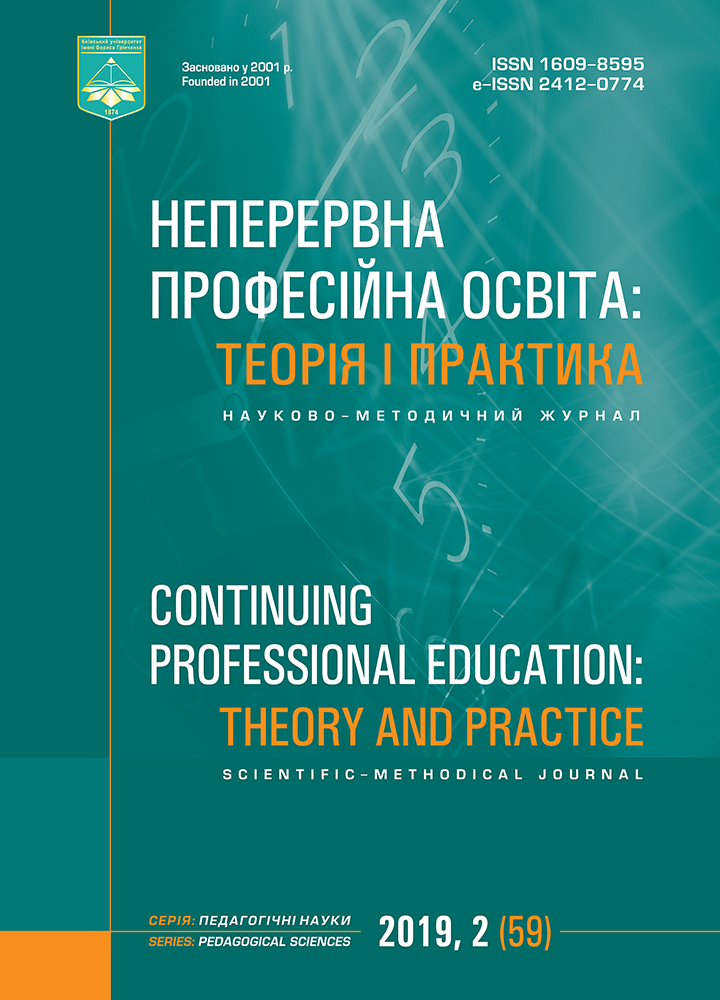FORMATION OF SAFETY SKILLS OF STUDENTS OF MACHINE-BUILDING SPECIALTIES: THEORETICAL ASPECT
DOI:
https://doi.org/10.28925/1609-8595.2019.2.1621Keywords:
institutions of higher education, mechanical engineering specialists, professional training, safety activities, safety competenceAbstract
The necessity of development of skills of safety activity of students of machine-building specialties in the process of professional training in institutions of higher education of technical direction are considered in the article. The urgency of the problem of formation of skills of safety activity future specialists in mechanical engineering in the process of professional training in institutions of higher education of technical direction is determined by the peculiarities of future professional activity. The key concepts of research are analyzed, in particular such as «safety activity», «safety competence», «culture of safety» and actual ways of developing labour-protection competence in the process of training specialists in machinebuilding specialties. Based on a solid analysis of scientific publications on the research problem, we outlined the conditions for the formation of skills of labour protection activities of future specialists in mechanical engineering in institutions of higher education. We relate to them clarification of the content of the concept of «labour protection competence» taking into account the peculiarities of the professional activity of specialists in the machine-building industry, determination of the components of safety competence of specialists of the machine-building industry and its interconnections in the structure of professional competence, determination of peculiarities and tasks of formation of safety competence of specialists in the machinebuilding industry in the system of professional training, ensuring motivation for the development of safety competence of future specialists in the machine-building industry as a necessary condition for professional adaptation and further professional growth, determination of the peculiarities of skills development in safety activities in the process of theoretical and practical training, industrial practice and graduation design, as well as the selection of appropriate pedagogical means for the educational process. Prospects for further research, we see in the development of methodological conditions and ways of developing the safety competence of future specialists in mechanical engineering at all stages of professional training in higher education institutionsReferences
Avramenko, O. S. (2015). Pratseokhoronna kompetentnist yak faktor uspishnoi profesiinoi diialnosti maibutnoho fakhivtsia [Labor protection competence as a factor of successful professional activity of the future specialist]. Visnyk Hlukhivskoho natsionalnoho pedahohichnoho universytetu imeni Oleksandra Dovzhenka. Seriya : Pedahohichni nauky, 27, 137–141 (ukr).
Vorobev, Yu. L. (Ed.) (2006). Osnovy formyrovanyia kultury bezopasnosty zhyznedeiatelnosty naselenyia [The basics of forming a safety culture of vital activities of the population]. Moskow, Russia: Delovoj ekspress (rus).
Hrynov, S. Ia. (2013). Pro stan kultury okhorony pratsi kerivnykiv pidpryiemstv [About the state of the labor protection culture of enterprise managers]. Science and Education a New Dimension. Pedagogy and Psychology, I (6), Issue: 10, 66–69 (ukr).
Demidova, Yu. Ie., & Shakhova, H. A. (2017). Formuvannia kompetentsii z bezpeky profesiinoi diialnosti yak vazhlyva skladova pidhotovky mahistriv u vyshchykh navchalnykh zakladakh [Formation of competencies in the safety of professional activity as an important component of masters’ training in higher educational institutions.]. Visnyk universytetu imeni Alfreda Nobelia. Seriia «Pedahohika i psykholohiia». Pedahohichni nauky, 1 (13), 182–187 (ukr).
Zinchenko, V., & Avramenko, O. (2018). Modeliuvannia protsesu formuvannia pratseokhoronnoi kompetentnosti maibutnikh inzheneriv haluzi znan «Elektronika ta telekomunikatsii» u protsesi profesiinoi pidhotovky [Simulation of the process of formation of labor protection competence of future engineers of the field of knowledge «Electronics and Telecommunications» in the process of professional training]. Pedahohichni nauky: teoriia, istoriia, innovatsiini tekhnolohii, 6 (80), 183–197 (ukr).
Zorina, M. O. (2010). Do problemy vyznachennia aktualnosti y osoblyvostei formuvannia kultury bezpeky zhyttiediialnosti [To the problem of determining the relevance and peculiarities of the formation of a safety culture of vital activity]. Pedahohika formuvannia tvorchoi osobystosti u vyshchii i zahalnoosvitnii shkolakh, 8, 149–153 (ukr).
Kobylianskyi, O. V. (2013). Kompetentnisnyi pidkhid do vyvchennia dystsyplin tsyklu bezpeky zhyttiediialnosti u vyshchykh navchalnykh zakladakh [Competency approach to the study of the disciplines of the life cycle safety cycle in higher educational institutions]. Naukovyi visnyk Skhidnoievropeiskoho natsionalnoho universytetu imeni Lesi Ukrainky, 7, 42–47 (ukr).
Kulalaieva, N. V., Marmazynskyi, O. A., & Mykhailiuk, V. O. (2013). Vykhovna skladova pedahohiky bezpeky: monohrafiia [Educational component of safety pedagogy: monograph]. Mykolaiv, Ukraine: NUK (ukr).
Lysiuk, M. (2010). Kultura okhorony pratsi na pidpryiemstvi [Culture of labor protection at the enterprise]. Okhorona pratsi, 11, 12–13 (ukr).
Pavlenko, T. S. (2006). Modeliuvannia pratseokhoronnoi diialnosti inzhenera yak sposib efektyvnoi orhanizatsii navchalnoho protsesu z promyslovoi bezpeky [Modeling of labor protection activity of the engineer as a way of effective organization of the educational process on industrial safety]. Naukovi pratsi: Naukovo-metodychnyi zhurnal Pedahohichni nauky. Mykolaiv, Ukraine: MDHU im. P. Mohyly, 50 (37), 72–75 (ukr).
Romaniv, L. V., Pishak, O. V., & Boichuk, R. R. (2017). Kultura bezpeky yak skladova bazovoi kultury osobystosti [Culture of safety as a component of the basic culture of personality]. Molodyi vchenyi, 3.1 (43.1), 238–241 (ukr).
Skaletskyi, Yu. M., Biriukov, D. S., Martiusheva, O. O., & Yatsenko, L. D. (2012). Problemy vprovadzhennia kultury bezpeky v Ukraini: analitychna dopovid [Problems of implementation of the safety culture in Ukraine: analytical report]. Kyiv, Ukraine: NISD (ukr).
Sokolova, S. N., & Sokolova, A. A. (2017). Fylosofyia bezopasnosty cheloveka y obshchestva [Philosophy of human safety and society]. Bezopasnost cheloveka y obshchestva: sovershenstvovanye systemy rehulyrovanyia y upravlenyia zashchytoi ot chrezvychainykh sytuatsyi: sbornyk nauchnykh statei mezhdunarodnoi konferentsyy. Mynsk, Belarus: UHZ, 117–120 (rus).
Tereverko, O. (2010). Kultura okhorony pratsi v dokumentakh MOP [Culture of labor protection in the documents of the ILO]. Okhorona pratsi, 7, 22–26 (ukr).
Faleev, M. Y. (2010). Kultura bezopasnosty: neobkhodymost y puty formyrovanyia [Safety culture: the need and ways of formation]. Hrazhdanskaia zashchyta, 8, 13–15 (rus).
Khrokolov, V. A. (2017). Kultura bezopasnosty: osnovnye aspekty razvytyia [Safety culture: basic aspects of development]. Vestnyk Polesskoho hosudarstvennoho unyversyteta. seryia obshchestvennykh y humanytarnykh nauk, № 2, 41–46 (rus).
Downloads
How to Cite
Issue
Section
License
Copyright (c) 2020 Sofia Dembitskaya

This work is licensed under a Creative Commons Attribution-NonCommercial 3.0 Unported License.



